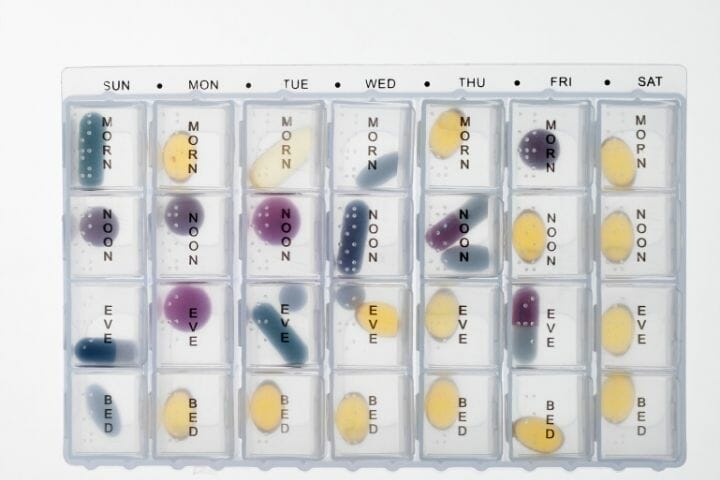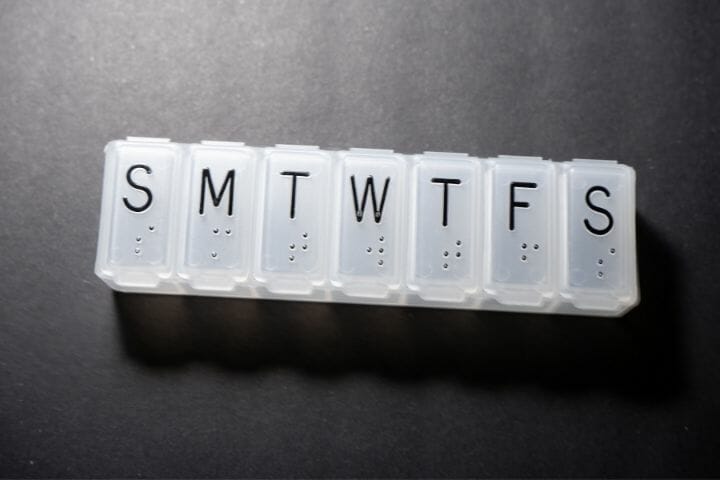It is not enough to know the right drugs for a problem- understanding drug schedules and rigid adherence are critical in patient care. Learn more about what to do as a caregiver.
Contents
As we grow old, we get more vulnerable to diseases and conditions. Drugs or medicines are an essential part of one’s life if the person is growing old or suffering from some condition. Due to this, our drug consumption also increases significantly. Studies say that seniors above the age of 65 take more than five drugs a day.

As a caregiver, you might be working with seniors who have lost their cognitive faculties, physical health, and emotional stability. Your task is to make sure that despite all challenges, you have to make sure that these older adults receive all medication on time and are looked after in terms of physical, dietary, medicinal, and other requirements.
As a caregiver, you must adhere to the drug schedule given to you, and it is very important for you to understand these schedules in detail. That is why we have created this guide to discuss the proper way to maintain a schedule.
Importance Of Medication For Seniors
Medication is an essential step for recovery these days for all patients. Modern medication has seen a significant quality improvement. This improvement is because of the advancement in technology and the betterment of economies all over the world.
Medication is the most common form by which diseases are treated. Medicines are available in the market these days for conditions that were not curable a few years back. Modern drugs are responsible for improving the life expectancy of people. Patients are now leading a healthy life and an overall better lifestyle due to these medicines.
You might like to read: Seniors Guide To Managing Prescriptions And Medications
The Role of Caregivers in Medicine Management
Medicines can negatively affect seniors if they don’t take them properly. This is where caregivers can help manage drug schedules.
Aging makes people more vulnerable to medication-related problems, also known as MRP’S. However, as caregivers, you should remember that these problems can be entirely prevented.
About 1.5 million senior people above 65 live in nursing homes, whereas about 1 million live in assisted living centers. Some of these admissions in nursing homes are because of the patient’s inability to take medication properly. Caregivers are also trained to identify these problems early and prevent them from developing.

Caregivers can help the majority of these people to manage their medicines and treatment on time. Caregivers can not always work with the patients as well, as sometimes patients suffering from degenerative conditions might not be able to understand all the instructions clearly.
Patients suffering from Alzheimer’s disease or other memory impairments are among the people that rely entirely on others for medication. About 6.2 million people in America are living with Alzheimer’s or dementia.
Things to Take Care of as a Caregiver
It is evident that seniors will face challenges while taking their medicines. As a caregiver, you can be there for them in these challenging times and help them maintain their health. Some of the essential tasks with which a caregiver can help you are given below as:-
If the patient is unable to remember taking medicines
As a caregiver, you can provide your patient with various special pillboxes or any other aids. Firstly, you can try to explain to them their medication schedule.
If they cannot remember anything, you can go for different ways to help them. You can use simple containers and label them according to the meal schedule—labeling medicines such as breakfast, lunch, dinner, and so on.
If you want to go for high-tech options, you can go for containers with built-in alarms. These containers will start to beep automatically when the time approaches. All you will have to do is set the alarm on these containers.
Even special bottle caps are available in the market that counts the number of times you have opened the bottle. This will remind the patient whether they have taken the medicine today or not. Patients suffering from severe memory loss or impairment will be utterly dependent on you to administer the medicine. In this case, these alarms and other devices can be a good way to remember proper drug schedules yourself.

Visual difficulty to the patient
Macular degeneration and resulting in poor eyesight are very common in older adults. If the patient or the elderly you are looking after has a visual impairment, then taking the correct medicine can be challenging for them.
Such people are unable to identify the labels of their drugs. You can print their prescriptions for them in a larger font to identify the medicines. You can also get them a magnifying glass if they have weak eyesight as a quick fix.
You can also give them the medicine yourself to ensure that they are taking the proper medication at the right time. Sometimes reading the intrusions aloud to the patient can also prove helpful.
If the patient has difficulty in hearing
You will also need to help some patients who might have difficulty hearing. If the patient is hard of hearing, you can talk to them at a louder pitch and encourage other people to do the same.
Older adults who have difficulty hearing may not understand the doctor’s prescription correctly, or sometimes they may not fully understand the drug schedule they are to follow. You have to help them by speaking to their physician to explain everything in a loud and clear tone and assist the discussion through visual representation of the schedule.
Another effective way of communicating with such people is writing the information for them. You can write down the medication schedule in detail to gather and understand the information.
If the patient is unable to perform physical activities
Lack of dexterity is also a significant reason why seniors might require the assistance of caregivers. Seniors might not be able to perform simple tasks such as opening the bottles, unable to break or taking the tablets, unable to move, and so on.
There are a lot of other problems related to the dexterity of the patient, such as being unable to use eye drops if they have weak eyesight, issues associated with using an inhaler if you have asthma, etc. There are about 25 million people in America that have asthma.

Similarly, you would also require someone’s help to get insulin injections if you have diabetes. As a solution to these problems, you can use large easy-open bottles. These bottles are available for all types of medicines. As a caregiver, you can even split the tablets for your patient.
If the patient has problems while swallowing the medicines
Many prescriptions may include larger capsules or tablets. These medicines can be challenging to swallow. As a caregiver, you can use alternatives to these tablets if they are available in a liquid form.
This will significantly reduce the difficulties related to swallowing. You can consult your pharmacists or your doctors for alternative dosage forms. You will also get to interact with people who cannot swallow tablets and capsules.
Proper scheduling of the medicines
Scheduling is among the significant problems with which a senior might struggle daily. Missing any medicine in a day can disturb the whole recovery process. Caregivers should devise a particular plan and schedule the medicine properly.
Effective Medication Reminder Strategies
Being a caregiver, you can:
- Build a morning or bedtime routine of medication for the elderly.
- Set up timed reminders for medicines.
- You can wear a medicine reminder device for the timely medication of elders.
- Make the elders take medication with meals.
- Use mobile apps for medicine reminders.

What To Do If You Have Too Many Medicines?
This is a severe problem for people with disabilities. This is one of the most common problems seniors face related to medication. This is also referred to as polypharmacy commonly.
If you consume more and more medicines, you will be more vulnerable to medication-related problems. As a caregiver, the toughest challenge you will face is the weekends and holidays. You’ll have to maintain stocks of the medicines, check their availability, label them, and so on.
How Can You Prevent Medication-Related Problems?
The best way to prevent medication-related problems is by first knowing what these problems are. Medicines can directly impact the functioning of senior or disabled people. The symptoms of MRP’S are given as:-
- Drowsiness: This is a common symptom for people taking too much medicine. As we know, drugs are made up of chemicals. Consumption of different chemicals can confuse our bodies and result in constant drowsiness. This is a condition in which you might feel nauseous.
- Confusion: Excess of medication can also confuse. If the patient is suffering from any cognitive dissonance, this confusion can be pretty prevalent. As a caregiver, you will have to deal with these people carefully. Being stern and strict with them is not an option. You have to try and understand their perspective as well. They are not willingly trying to get confused. It’s just that their brain is unable to process some information.
- Depression: Depression is a common enemy to most seniors these days. It is often also regarded as a silent killer. You must be there for your patient to provide mental and emotional support. Emotional support is a very underrated service provided by caregivers.
- Delirium: This is a condition related to severe disturbances in their mental abilities. Patients suffering from this condition have less concentration and reduced awareness. People also experience confused thinking and are not sure about their surroundings. The leading causes for this condition are related to either intoxication or sleep deprivation.

- Insomnia: This is a condition related to lack or loss of sleep in people. As caregivers, you should be responsible for ensuring that your patient can get the right amount of sleep. Consuming medicines not on a regular schedule can result in the development of this condition.
- Parkinson’s: This is a disorder of the central nervous system. Patients suffering from this condition usually suffer from involuntary movements such as tremors. The primary reason for this condition is the drop in dopamine levels in the brain. The patient may also experience nerve cell damage in the brain.
- Weakness: This is also a significant result of MRP’S. You might experience this weakness when your body is unable to cope with the disease and you cannot get a sufficient amount of rest. You will need to take extra care of such patients as, most of the time, they are also unable to carry out the tasks related to physical strength as well.
- Loss of appetite: Loss of appetite is also a common occurrence among people consuming a lot of medicines per day. Sometimes the patient might feel fed up with eating medication throughout the day. This may result in a disbalance of the medicine schedule you have prepared. It is your responsibility not to let your patients skip any medication. You can do various things to keep their spirits from dropping. A person eating lots of medicine must have a balanced diet. Otherwise, even the medication won’t be able to work correctly.
- Fractures: Fractures are a common occurrence among the elderly. The primary reason for this is that the muscles and bones of the person start to grow old due to aging. Due to this, there is a severe loss of strength and balance among the patients.
- Speech and memory: Some medicines can also harm your body, such as increased memory loss. On the other hand, some people might also experience speech impediments.
What Happens If The Patient Takes A Low Dose?
The consequences of taking a lower dosage can be minimal or severe, depending on the condition the medication is treating. You should administer the right amount of medicine to the patients if they are not facing any side effects.
Even if the dosage is causing a few side effects, refer immediately to the physician instead of trying to reduce the dosage yourself.

What Happens If The Patient Takes A High Dose?
Similar to consumption of low dosage, taking a higher dosage of a medicine can also be harmful to your body. The effects depend on the strength, age, and disease of the patients.
The kidney and the liver of an older adult might not be as strong as an adult person. A senior person is more vulnerable to the distribution of fat in the body, and overdose can cause them to suffer from adverse drug effects.
You should also be careful that the patient is not allergic to any medicines. You should not also consume foods that can harm your health. One of the common reactions to a medication can be thinning the blood. Blood-thinning can lead to the development of other diseases and problems as well.
Wrap Up
Drug scheduling is an important task that is the responsibility of a caregiver. It is a challenging and laborious task. As a caregiver, you are bound to face some difficulties while looking after a senior person. We have discussed the problems you might have and the suggestions that might help you tackle these problems.
We hope you found the content and especially the what to do sections useful for your role as a caregiver to an older/ incapacitated adult. You can reach out to us if you have more queries. Do please share the article with others like yourself who want to understand the risks of improper drug scheduling.
